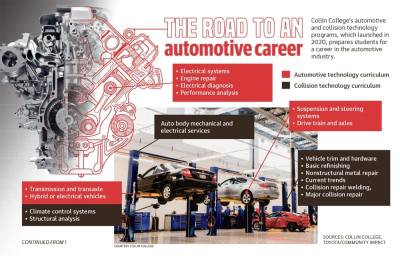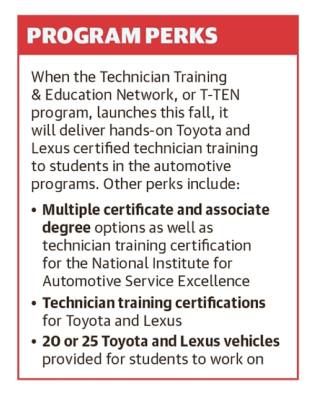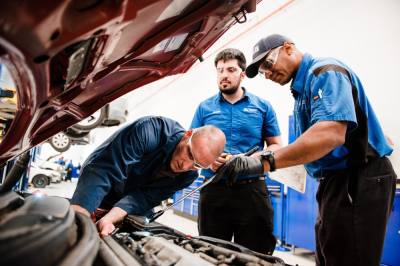School officials announced in February the campus would be offering Toyota’s Technician Training & Education Network, or T-TEN, program to serve as a fast track for students looking to work as technicians in Toyota or Lexus dealerships. The program will launch in fall of 2023.
Brenden Mesch, Collin College Technical College provost, said having the program in the county is very prestigious.
“It’s considered the Harvard of these [programs],” Mesch said. “It’s a great opportunity for students, because in the T-TEN world, all the students that are going to school are also working in a dealership.”
The program focuses on training students on technology in the latest Toyota vehicles, something T-TEN Program Manager Joe Myers said sets the program apart.
“We get very specific in what the current technology is coming into the dealership,” he said. “When a student is being trained on the very vehicle that’s rolling through the door at that dealership, that makes them job-ready.”
As the program rolls out, Collin College will have 20-25 vehicles on location for training at any given time, according to Mesch. He also said the college will be adding more lifts to max out its facility.
One of the T-TEN program’s biggest perks is that it attempts to pair students with a dealership for employment “on day one,” according to Myers.
That is a perk for the dealerships as well, as demand for automative technicians is expected to continue rising, according to the Texas Workforce Commission.
The commission estimates employment of automotive technicians will rise by more than 12% from 2020 to around 17,720 jobs in 2030.
As part of its efforts to help fill that need, Collin College has previously partnered with Honda, Mercedes and Ford. The school also has a pre-existing relationship with Toyota for its Technical Education College Support Elite program.
Mesch said those programs provided “relatively light resources” compared to the T-TEN program, which he called a “pinnacle.”
“It’s a group of community college and technical campus locations throughout the country that collaborate and develop curriculum together,” he said.
Only 38 schools across the country offer the T-TEN program, according to the program’s website. That is partly due to the cost, and Myers said the program is around a $750,000 investment for Toyota this year, with “ongoing commitments,” along with a significant investment from the school.
But all of the aspects lined up for the program to launch at Collin College, according to Myers.
Toyota started building a relationship with the school when it moved its national headquarters to Plano in 2014. When Toyota was looking for more opportunities in the area, Myers called partnering with Collin College a “no-brainer.”
“This area is growing very rapidly, and in order to stay ahead of—or even just stay current with—the need, it required us to look at more opportunities in this area,” Myers said. “I wouldn’t say that being neighbors with Collin College made the difference, but with the quality of the institution, it being close to our headquarters and meeting this need in the area, we couldn’t have asked for something better.”
The T-TEN program provides another opportunity at Collin College’s technical campus that has grown steadily since opening in Allen in 2020.
The campus offers programs that fall under architecture and construction, engineering technology, health sciences, nursing, automotive technology, and more.
“It’s called the technical campus, but it’s much more than just technical coursework,” Mesch said. “No one ever comes here, does a tour and says, ‘I’ve seen something like this before.’”
Mesch said the campus has around 2,200 students enrolled for the spring, but still has plenty of room to grow, especially with more enrollment for classes in the mornings and afternoons.
He said the T-TEN program is another step toward that growth.
“There’s a long-term trajectory,” Mesch said. “[The T-TEN program] is a great example of a community college working with an industry to provide graduates with knowledge, skills and abilities, while creating a really seamless pathway for a future career.”








